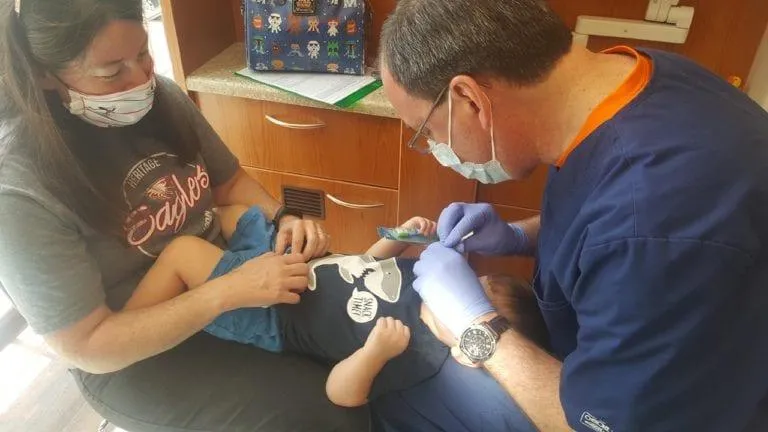WELCOME TO
HURST PEDIATRIC DENTISTRY!
Here at the pediatric dental office of Dr. Joby Hurst, we take pride in offering our young patients the highest quality of dental care in a kid-friendly environment. We are conveniently located in Birmingham, Alabama and are experienced in providing routine dental care for infants, children, teens and patients with special needs.
Dr. Hurst and his team of friendly professionals work together to provide a positive dental experience that will make your child smile! We promise to work with you and your child personally and create a customized treatment plan to meet your individual needs and desires.
Office tour
Early Dental Care
We believe early dental care can promote a lifetime of healthy smiles for your child. We offer a full range of services from routine dental exams and cleanings to fillings, sealants and fluoride treatments that will help ensure that your child grows up with a healthy smile.
Sedation Dentistry
We recognize that for some of our patients, a visit to the dentist makes them a bit nervous.
We offer nitrous oxide sedation for our more apprehensive patients, so they can relax while receiving the dental care that they need.
For those requiring more intensive treatment, Dr. Hurst offers in office anesthesia using Dr. Jeff Plagenhoef.
Dr. Jeff is a board-certified pediatric anesthesiologist with Pediatric Dental Anesthesia Associates.
We appreciate your interest in our practice and encourage you to continue exploring our website to learn more about us. Feel free to contact us to schedule an appointment with Dr. Joby Hurst today!

Blogs and Resources

How to Care for Your Child's Tooth After a Filling
The Importance of Dental Fillings and Post-Filling Care
Dental fillings are important for keeping teeth healthy. They stop further decay and fix damaged teeth. In restorative dentistry, fillings are used to repair cavities caused by tooth decay and other types of damage.
Understanding the right post-filling care ensures optimal recovery. This article aims to provide comprehensive guidance on how to care for your child’s tooth after receiving a filling, helping you maintain your dental health effectively. By following these guidelines, you can promote healing and extend the life of the restoration.
Understanding Dental Fillings
Dental fillings are an important part of restorative dentistry. They are used to fix teeth that have been damaged by decay or injury. Fillings help restore the tooth's function and prevent further damage. When a tooth is filled, it not only relieves pain but also protects the tooth from future problems.
Types of Dental Fillings
There are two common types of fillings your child can receive: composite fillings and metal fillings.
Composite Fillings
Composite fillings are made from a combination of plastic resin and glass. They are designed to match the natural color of teeth, making them an ideal choice for front teeth or visible areas.
Metal Fillings
Metal fillings, on the other hand, are usually made from amalgam, which contains mercury, silver, tin, and copper. These fillings are known for their strength and durability, making them suitable for back teeth where chewing pressure is higher.

Factors Influencing Filling Selection
When recommending filling types, pediatric dentists take several factors into account:
Location of the Filling: Whether it's a front or back tooth can affect aesthetic preferences.
Extent of Decay: More extensive decay may require stronger materials.
Patient's Dental and Medical History: Allergies or sensitivities to certain materials can influence choices.
Understanding these factors can help parents of patients make better decisions about their child’s dental care.
Immediate Aftercare Following a Filling Procedure
Receiving a dental filling is an important step in restoring oral health, but it can sometimes cause discomfort. Knowing how to manage pain and sensitivity after the procedure is essential for a smooth recovery.
Managing Pain and Discomfort After a Filling
Pain after a filling can come from different sources. It's important to understand that some discomfort is normal as the tooth gets used to the filling material. Common causes of pain may include:
Inflammation: The area around the filled tooth may become irritated.
Pressure Sensitivity: Your child may feel discomfort when biting down on the treated tooth.
Nerve Reaction: The nerves inside the tooth can react to the filling material, causing temporary sensitivity.
It's crucial to differentiate between normal discomfort and potential problems. If your child has ongoing pain, swelling, or any unusual symptoms like drainage, it's important to contact your child’s dentist right away.
For managing pain after getting a filling, several over-the-counter medications can help:
Acetaminophen: This common pain reliever helps reduce discomfort without affecting inflammation.
Ibuprofen: This non-steroidal anti-inflammatory drug (NSAID) effectively relieves both pain and inflammation.
Always follow the dosage instructions on the packaging and talk to your pediatric dentist if you have concerns about medication interactions.

Dealing with Sensitivity After a Filling
Sensitivity is another common issue after receiving a filling. Many people report increased sensitivity to hot or cold temperatures for up to two days after the treatment. During this time, avoiding extremely hot or cold foods and drinks can help minimize discomfort. If your child is experiencing prolonged sensitivity, it’s advisable to consult with their pediatric dentist for further guidance.
To manage this sensitivity after a dental filling, consider these tips:
Avoid Extreme Temperatures: Steer clear of very hot or cold beverages for several days. This practice helps minimize discomfort and allows your tooth to adjust.
Opt for Soft Foods: During recovery, choose soft food options that require less pressure on your filled tooth.
Use Pain Relief: Over-the-counter medications, such as acetaminophen or ibuprofen, can provide effective pain management if needed.
Being mindful of these strategies can ease discomfort while promoting a smoother recovery process after your dental treatment.
Promoting Healing During Recovery
Implementing these strategies for pain relief following a filling not only will help your child feel more comfortable but also support the healing process. By understanding what sensations are normal and which ones might be cause for concern, you have the power to take appropriate action during the recovery process.
Guidelines for Eating After Receiving a Dental Filling
Eating after a filling procedure requires some consideration to ensure the longevity of your dental restoration. Following these guidelines can help protect your child’s new filling and promote healing.
Foods to Avoid
Immediately after the filling procedure, certain foods should be avoided to prevent damage or dislodgement of the restoration:
Hard Foods: Items like nuts, hard candies, or raw vegetables can put undue stress on your new filling.
Sticky Foods: Chewy snacks such as caramel or taffy might pull at the filling, risking its integrity.
Crunchy Foods: Chips or pretzels can easily chip or break a newly placed restoration.

Recommended Soft Food Options
During the initial healing period, focus on incorporating soft foods into your child’s diet. Here are some safe options for the soft food diet:
Mashed Potatoes: Creamy and easy to eat, they provide comfort without strain.
Yogurt: A nutritious option that is gentle on sensitive teeth.
Smoothies: Blend fruits and veggies for a refreshing drink that’s easy to consume.
Soups: Warm (not hot) broth-based soups can be soothing and nourishing.
Monitoring The Tooth For Any Issues Following A Filling Procedure
After a filling, it's important to keep an eye on your child’s tooth to ensure everything is healing properly. Being aware of any potential problems is key to keeping their mouth healthy. Here are some signs to watch out for that might indicate issues:
Increased Pain: If you notice a significant increase in discomfort beyond the first few days, it could be a sign of a problem.
Swelling or Redness: Any swelling around the filled area should raise concern, as it may indicate infection.
Sensitivity Changes: Prolonged sensitivity to temperature or pressure might suggest a restoration failure.
Discoloration or Drainage: The darkening of the filling or any discharge warrants immediate attention.
If you experience any of these symptoms, it's crucial to reach out to your dentist for professional help. Acting quickly can prevent further complications and ensure the filling stays effective and your child’s oral health remains intact. Regular check-ups and careful monitoring are essential for maintaining good dental health.

The Importance Of Regular Dental Check-ups for Long-term Oral Health Maintenance
Regular dental check-ups are crucial for preserving both the integrity of fillings and the overall health of your child’s teeth and gums. Dentists typically recommend visiting every six months. During these visits, professionals assess the condition of existing fillings, ensuring they remain intact and functional.
Benefits of regular check-ups include:
Early Detection: Identifying potential issues before they escalate into serious problems.
Professional Cleaning: Removing plaque and tartar buildup that can lead to decay.
Tailored Advice: Receiving personalized care tips based on your child’s unique oral health needs.
Maintaining this routine fosters a proactive approach to oral health, reinforcing the longevity of your child’s dental work.
Conclusion
Effective care after a dental filling is crucial for optimal recovery. Maintaining a good oral hygiene routine is key to preserving your child’s dental work.
This includes brushing twice a day with fluoride toothpaste, flossing daily, and using an antimicrobial mouthwash. These steps help prevent the buildup of plaque and bacteria that can lead to decay and damage to your child’s fillings.
Remember to schedule regular check-ups with your child’s dentist to address any potential issues early on and to receive professional cleanings that can further protect their dental work.
For your questions regarding dental filling care for your child, contact Dr. Joby Hurst at Hurst Pediatric Dentistry and schedule an appointment by calling (205) 969-7454.

19 INVERNESS CENTER PARKWAY, STE 250, BIRMINGHAM, AL 35242
TEL: 205.969.7454
E-MAIL: [email protected]
2018 © ALL RIGHTS RESERVED | PRIVACY POLICY | TERMS AND CONDITIONS
Site by Trustway Marketing Powered by Kyrios Systems